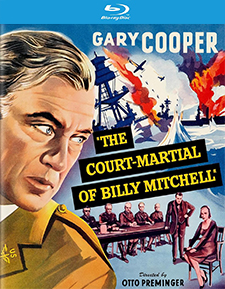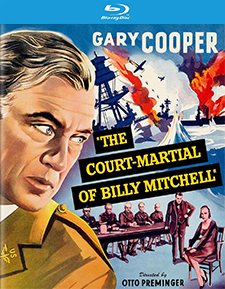Court-Martial of Billy Mitchell, The (Blu-ray Review)

Director
Otto PremingerRelease Date(s)
1955 (November 5, 2024)Studio(s)
United States Pictures/Warner Bros. (Kino Lorber Studio Classics)- Film/Program Grade: B+
- Video Grade: B+
- Audio Grade: A-
- Extras Grade: B-
Review
With few exceptions, 1950s Hollywood movies about the U.S. Armed Forces were aggressively patriotic and pro-military. Even Cinerama’s innocent travelogues usually found ways to insert unsubtle pro-American propaganda, often by showing off U.S military might in the form of the latest jet aircraft and carriers. Stanley Kramer’s production of The Caine Mutiny (1954) dared to show the U.S. Navy as something less than infallible, but counterbalanced its criticisms in showing a military system that ultimately works, justice prevailing. That film was a huge success ($2 million cost vs. $22 million at the box-office), paving the way for the somewhat similar The Court-Martial of Billy Mitchell (1955).
Politically conservative, despite its script’s charges of military incompetence, and dramatically clumsy at times, the picture is nonetheless quite interesting. It’s a quasi-biopic of Army Brig. General Billy Mitchell (Gary Cooper), who commanded American air combat units in France during World War I and today is regarded as the father of the modern U.S. Air Force. However, in the years following the Great War, Mitchell was a controversial, combative figure eventually put on trial for whistleblowing his complaints to the press.
Otto Preminger directed the all-over-the-map cast which, for instance, pairs as the prosecuting attorneys broad comedic character player Fred Clark with indulgent Method actor Rod Steiger. According to the Internet Movie Database (IMDb), Mitchell’s family was hoping James Cagney, an actor capable of expressing the historical Mitchell’s violent temper effectively, would portray him. Instead, Coop’s stubborn but placid approach ultimately comes off as ineffectual instead of heroic.
The Court-Martial of Billy Mitchell is one of a dozen films produced by Milton Sperling and his United States Pictures and released through Warner Bros. (Sperling was Harry Warner’s son-in-law), which helped finance their production. Warner Bros. no longer owns these dozen or so films. Instead, they are presently controlled by Paramount, who previously licensed the title to Olive Films. Their 2013 Blu-ray was a decent transfer of less-than-pristine film elements that were rife with speckling, blotches, varied damage, and other problems, compounded by WarnerColor, a less-than-vibrant process that seems to favor a dull brown. Kino’s new Blu-ray is derived from a 2023 4K scan. The film elements issues are still present, but the transfer is a definite improvement.
In the years following World War I, war hero Army Brig. General Billy Mitchell (Gary Cooper) tirelessly implores his superiors to establish a new branch of the Armed Forces, convinced the future of warfare lay in aircraft capable of devastating aerial bombings. (His speeches are as xenophobic and even paranoid as they are prophetic.) Not only are these pleas continually rejected, Mitchell’s existing flying force (whose pilots include Peter Graves and Darren McGavin) are limited to a tiny handful of antiquated planes left over from the last war, planes subject to so many mechanical failures they’re veritable death traps. The pilots don’t even wear parachutes.
Mitchell tries to prove the potential of an air attack at a public demonstration where his pilots attempt to sink the “unsinkable” German warship Ostfriesland. But Mitchell’s superior, Gen. Guthrie (Charles Bickford), does everything possible to ensure an unsuccessful bombing run. Mitchell does manage to spectacularly sink the German warship (played by an unconvincing model) but only by disobeying Gen. Guthrie’s explicit orders about the flight path and size of the bombs. Mitchell is demoted to Colonel and transferred to Fort Sam Houston.
The last straw comes when Mitchell’s close friend, Naval commander Zach Lansdowne (Jack Lord, with Elizabeth Montgomery as his wife, each making their film debut), feels duty-bound to follow orders and take the Shennendoah, a dirigible, on a publicity tour of the Midwest knowing weather conditions all but guarantee disaster for him and his men. The dirigible does indeed crash and all hands are lost. Incensed, Mitchell calls an unauthorized press conference (Gregory Walcott is one of the reporters) declaring, “incompetence, criminal negligence, and the almost treasonable administration of our national defense by the Navy and the War Department.”
A court-martial is ordered, and the second-half of the picture follows the claustrophobically photographed trial, the movie ending rather abruptly at its conclusion.
The film was an early CinemaScope production, with a screen shape Preminger quickly learned to expertly stage scenes involving large groupings of actors. But, here, many shots are awkwardly composed, and at least twice Preminger resorts to grainy, optical printer-induced close-shots that look just plain wrong. The warehouse converted into a courtroom for Billy Mitchell’s court-martial has a peculiar layout. Court spectators are delegated to a distant adjunct far from the action, and not once does Preminger cut away to a reaction shot of any of them. The set may be based on the historical space used for the real trial, but it’s so cramped Preminger’s cameras can’t even get the judges against one wall and the defendant and prosecutors all in the same shot.
Before all this, fortunately, is much good use of Washington D.C. locations. Other than the steps of the U.S. Capitol for one scene, the locations are interesting spaces, avoiding obvious choices, and these scenes are populated by period vehicles and extras adding to their verisimilitude. Further, all this is preceded by some good aerial sequences, but after the bombing of the Ostfriesland, planes aren’t seen again until the fade-out.
What is interesting about the film in retrospect is its depiction of a whistleblower whose revelations, while entirely accurate, seriously damage the credibility of the Armed Forces at home and abroad, making plain its inability to properly defend American shores, and its culpability in the senseless death of its loyal servicemen, all of which could be argued also provided aid and comfort to America’s enemies.
Not much has changed in the government’s treatment of such whistleblowers. Mitchell was a war hero and the son of a wealthy Wisconsin U.S. Senator, so the judges (including Douglas MacArthur) treat him with kid gloves. Though eventually convicted, Mitchell was vindicated in the years following his death (in 1936) thanks to his record of uncannily accurate predictions once scoffed at, from aircraft far exceeding the speed of sound to, especially, his belief, first published in 1924, that Japan would someday launch an aerial attacking on a vulnerable Pearl Harbor.
As Mitchell, Gary Cooper is basically playing a slight variation of his long-established screen persona. The screenplay has Mitchell walking a fine like, on one hand determined to have his day in court and make his case for a more modern, safer flying force, but also unwilling to besmirch the service itself, where he’s spent his entire adult life. Cagney may have been closer to the historical Mitchell, but Cooper better fits Sperling and Emmet Lavery’s script.
While Steiger is predictably a little indulgent it’s nonetheless fascinating watching his verbal sparring with Coop, and the film is chockful of established and rising talent—also in the cast: James Daly, Ralph Bellamy, Robert F. Simon, etc.—as well as actors playing historical figures, perhaps most amusingly comic bit player Phil Arnold as Fiorello La Guardia and Ian Wolfe as President Calvin Coolidge.
As described in more detail above, The Court-Martial of Billy Mitchell is a good transfer of damaged film elements, with scratches and speckling galore. But, for what it is, it’s certainly a film-like viewing experience, and for cup-half-full viewers like myself, presented no great distractions, though its dog-eared appearance is unavoidable. Originally released with 4-track magnetic stereo, Olive’s earlier Blu-ray was apparently mono, but Kino offers a DTS-HD Master Audio 2.0 stereo mix, better approximating the aurally immersive theatrical run, though the dialogue appears centered and non-directional. However, Dimitri Tiomkin’s score really comes to life. Optional English subtitles are provided, and the disc is Region “A” encoded.
The Olive release had no extra features, but this release includes one, an audio commentary by filmmaker Steve Mitchell writer Steven Jay Rubin.
A long way from great but still worthwhile and interesting, The Court-Martial of Billy Mitchell comes Recommended.
- Stuart Galbraith IV

